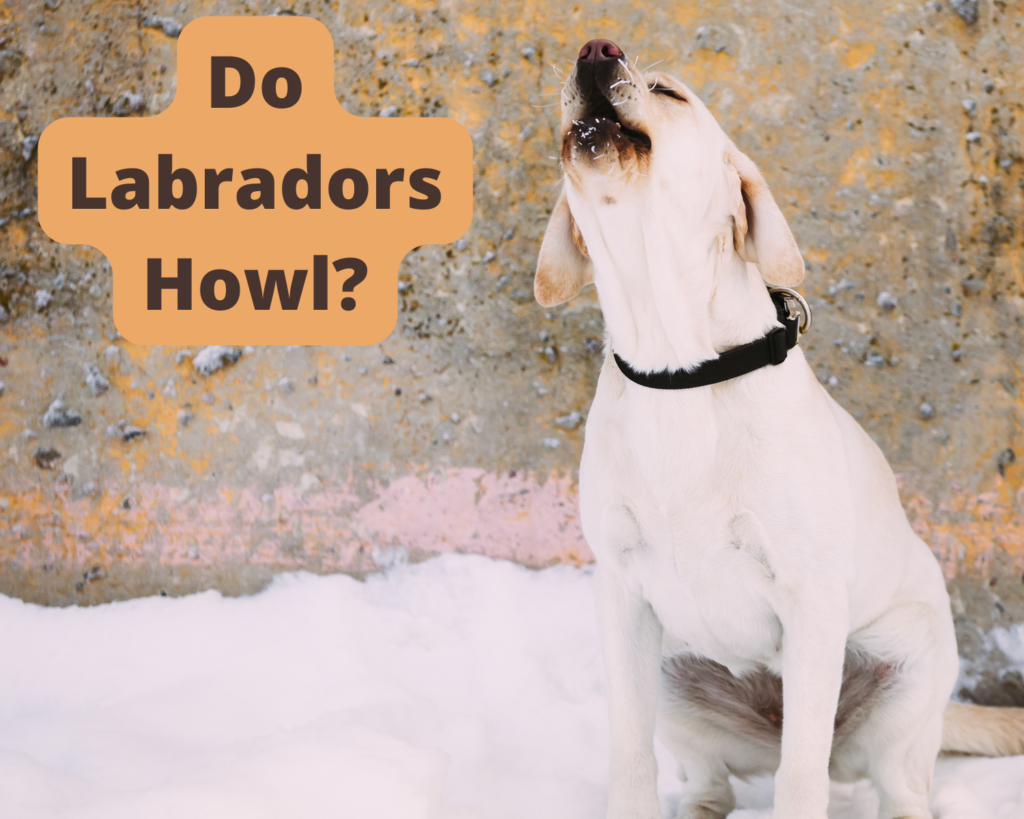It’s no secret that Labradors are one of the most popular dog breeds in the world. Initially bred in Newfoundland, Canada, to assist fishermen or hunt ducks, they are loyal, friendly, and make great family pets.
But do Labradors howl? And if so, why do they do it?
This blog post will explore the answer to that question and more.
Do Labradors Howl?
While Labrador Retrievers are not a breed prone to howling like Basset Hounds or Siberian Huskies, many will howl in reaction to their surroundings or to communicate with their owners or other animals.
Whether or not a Labrador will howl is also determined by the individual dog’s personality and behavior.
Reasons Why A Labrador Would Howl
There are many reasons why Labradors howl. For some Labs, it is simply part of their personality or because they are very reactive to different noises, while for others, it could be a sign that something is wrong.
Getting to the root cause of your Labrador’s howling will allow you to help them and understand them better.
Separation Anxiety
Some Labs are known to howl because they experience separation anxiety. When they are left alone, they may become anxious and start to howl.
The howling could signify that they are worried that the family member who left is not coming back.
Labs are highly social animals and want to feel secure with their owners. When they howl, it may be a way of communicating their anxiety and letting their owners know they are worried or insecure.
Dogs that howl due to separation anxiety usually also exhibit other behaviors when left alone.
These behaviors include pacing, destroying items in the house, going to the bathroom in the house, or trying to escape. If your Labrador is constantly howling when you leave and has severe separation anxiety, it is essential to get them help.
Working with a professional trainer using techniques like counterconditioning and desensitization can help treat your Lab’s separation anxiety.
Boredom
Labradors are a very active breed and require a lot of exercise and stimulation, so they do not become bored. If you find that your Labrador Retriever is howling because of boredom, you will want to involve them in more activities.
One way to keep Labs occupied is to take them on daily walks or toss a ball in a park or a backyard to get them enough exercise and stimulation.
Most Labradors also love to swim, so if you have a dog-friendly lake or dog beach, you can take them swimming to help keep them both physically and mentally fit.
Communication
Barking and howling is one of the many ways dogs express themselves. Labrador Retrievers, like all dogs, are descended from wolves, who howl to communicate with each other across long distances.
Your Lab may be howling to communicate with you or other animals in your home. If you have other dogs in your home that howl, your Lab may also be howling to mimic their sound.
Excitement
One reason your Labrador might be howling is that they are excited. Your Labrador might howl when you come home after being gone for a while since they are excited to see you and are communicating that they missed you.
Dogs also tend to howl when they are excited about something like getting a treat or being praised after doing a trick.
So if you have a Labrador, don’t be surprised if they let out a few howls – it’s just their way of expressing excitement!
Responding To Another Sound
Labradors and other dogs are well known for their propensity to howl in response to various sounds.
Sirens of ambulances or fire trucks can often set them off, as can music and even musical instruments. Most dogs will stop howling once the noise stops.
Attention
One common reason Labrador Retrievers might howl is to get their owner’s attention. Over time your Lab has learned that howling will get them what they want.
Labs will also usually howl when they want something specific, like food, treats, or toys. However, if this behavior is not corrected, it can become a nuisance.
Training your Labrador Retriever to know that howling will not get them what they want is integral to stopping this behavior. With time and patience, your Lab will learn that being quiet will get them the attention they desire.
Medical Issue
Howling can be a sign that something is wrong or that there is a medical issue, so it’s essential to be aware of any changes in your Lab’s behavior.
If your Lab starts howling more than usual, it is important to check them for any injuries and to take them to your veterinarian to rule out any potential illnesses.
Alert Owner To Danger
Another reason your Lab might be howling is to alert you of a possible threat. Dogs come from wolves who use howling to communicate with other pack members and warn them of danger or predators.
Dogs also have much better hearing than people, so your Labrador howling may be alerting you to another person or animal that they perceive as a threat.
So next time you hear your Labrador howling, be sure to take a look around and see what they are trying to tell you!
Why Does My Labrador Howl At Night?
Labradors howl at night for many of the same reasons they howl during the day. Your Lab’s howling may be more noticeable at night since there is less noise compared to the daytime.
Since it is quieter at night if your dog hears a sudden noise, it may trigger them to howl to alert you to another person or animal that they hear.
High-pitched sounds like ambulances and fire trucks also might seem louder to your dog since there is less noise. Labradors might howl due to their ears being irritated by the noise or because it resembles the sound of a howl.
Conclusion
Labradors howl for many different reasons ranging from separation anxiety to trying to get the attention of their owner.
With the tips in this article, you can better understand the causes of your Lab’s howling and the best ways to help them if needed.

